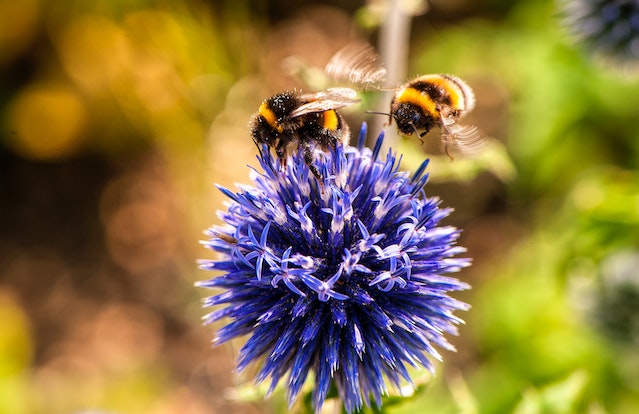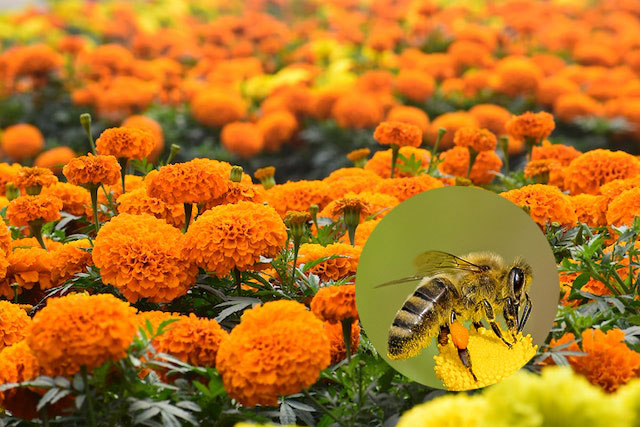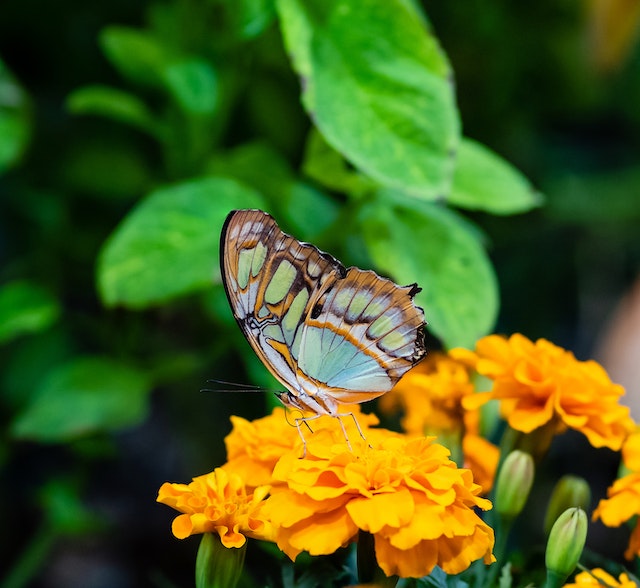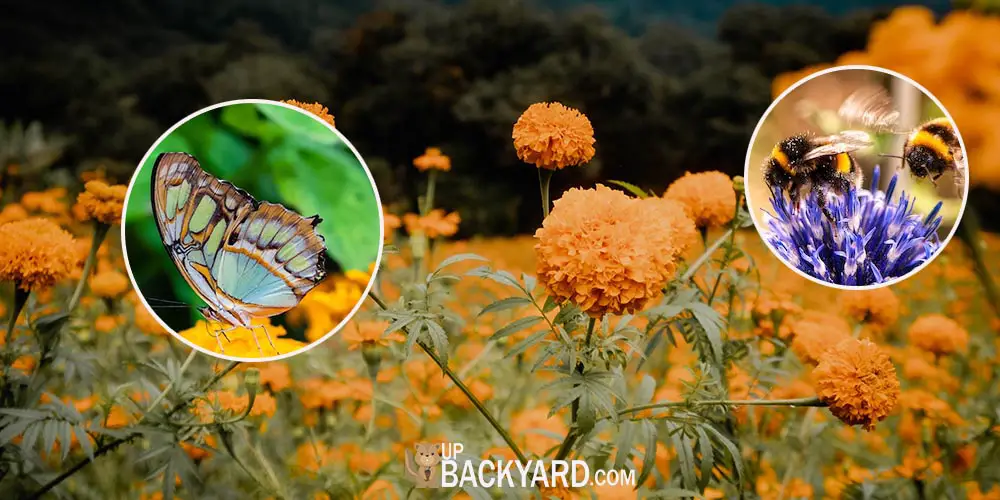When you want to have a garden that is big, beautiful, and full of bright flowers, you need to have plenty of pollinators coming to your area.
To get those pollinators, there are a variety of gardening strategies you can utilize to make your garden a pollinator’s heaven.
One of these methods includes planting bright flowers. The vibrancy of flowers will catch the eyes of pollinators and encourage them to stop by. Marigolds are bright, do they also attract pollinators?
Are Marigolds Good at Attracting Pollinators to Your Garden?

Marigolds are super bright yellow flower that radiates like the sun. They have a strong smell yet still are attractive to both the human eye and the bug’s eye (for what eyes they have.)
All of the amazing attributes that marigolds have to offer the world are what make them great for attracting pollinators.
Why Are Marigolds Attractive to Pollinators?
The main reason that marigolds are attractive to pollinators is because of their bright color.
Many flowers that are bright in color are attractive to pollinators, whether it’s the bright yellows and oranges of marigolds or the red of cosmos.
Bright colors get the attention of the creatures around it. We as humans are more likely to stop and gaze out at bright and colorful flowers because we find them pretty.
Animals have an easier time seeing bright flowers because these colors stand out against the greens and blues of the world around them.
Pollinators also like marigolds because they aren’t bothered by the smell. Smell is a very attribute to a plant’s ability to attract or deter certain creatures.
Plants like eucalyptus and rosemary have strong smells that small creatures don’t enjoy. They use that smell to keep themselves safe from predators.
Other plants like marigolds have more tolerable smells that end up attracting pollinators so that they can spread.
You might also like: Do Deer Eat Marigolds? + (8 Deer-Resistant Plants)
Marigolds also make the pollinating process super easy. The way that this flower is structured is very open and accessible. This flower has petals that have nectar nestled inside so pollinators have an easier time doing their job.
There are many varieties of marigolds that you can plant. If attracting pollinators is your goal, make sure to choose a marigold variation that has very open florets.
Pollinators love a flower that has easy access so marigolds like the French and Bambino variety are the ideal choice.
Pot marigold and corn marigold are also great if you want to make sure all pollinators are wanting to come to your garden.
Do Bees Like Marigold?

The variety of bees that are present all around us is for sure one of the most popular pollinators.
When we think of pollinators flying around our gardens, the honey and bumble bees are usually the first creatures to come to mind.
With there being several kinds of bees that can be present in your yard, you must take into consideration that the differences between the bees mean differences in their likes.
Not all bees are going to like marigolds. In fact, some variations of bees can even be repelled by them. On the other hand, other kinds of bees love marigolds and will often be seen getting the nectar from the florets of surrounding marigolds.
For some bees, the smell of marigolds is simply too much for them. This will deter some bees from chilling on your lawn, but marigolds alone won’t keep all bees away from your garden.
What Else Do Marigolds Attract?
With the variety of pollinators that are out there and in your area, the marigolds that you plant are likely to attract more than just a few bees. In fact, marigolds attract quite a few creatures of different sizes.
The smallest creatures that marigolds attract are aphids. These tiny creatures are essential to the ant population as they produce sugars that the ants eat.
Aphids love the color yellow, so having plenty of bright yellow marigolds in your yard will bring some tiny green aphids to their stems.

Butterflies, another lover of nectar, are also attracted to marigolds. They will arrive to get a quick sip of nectar from the marigolds that are in your garden. Because a butterfly has to land to get nectar from a flower, they are also considered pollinators.
This plant also attracts snails! If you love to see snails moving around your yard, then marigolds are sure to bring them to your garden.
The Repelling Powers of Marigold
While this plant will attract many creatures, marigold will also repel some insects in your garden.
Marigold will ward off types of worms that will infect the soil of your garden and cause your other plants to die.
The strong smell that marigolds have, while attractive to some creatures, is not attractive to harmful creatures at all.
Marigold might be a great snack for aphids, but they will keep ants away from your yard.
Ants have a strong ability to cause problems within a garden if their numbers get too high, so having a plant like marigold is good to keep that population low.
If you hate mosquitos, marigolds are one of those flowers that will keep those pesky bloodsuckers away from your space. This tiny bug isn’t wanted in any garden, so keeping them away is beneficial to you and anyone who comes over for a chat.
Basically, marigolds are a flower that is a part of the group of plants that will keep away unwanted creatures.
Marigolds are also great companion plants and will boost what is planted around them. That creates a pretty strong army against creatures that you want to keep far away from your garden.
If you want to learn more about what marigolds will do for you and your garden, watch this informative video!
You will surely be on board with planting marigolds in your garden after hearing all the great things about this flower.
Frequently Asked Questions
Do Marigolds Attract Bees and Wasps?
We’ve already discussed how marigolds attract some bees while not being of interest to others, but we haven’t talked about wasps.
Luckily for gardeners, wasps aren’t that interested in marigolds and won’t be attracted by them.
Wasps aren’t that enjoyable to have flying around your garden. They are quite angry and don’t have the stinging repercussions that bees do.
It’s good that marigolds don’t attract them if want to make sure that wasps aren’t fond of your garden.
When Should You Plant Marigolds?
If this article has convinced you that you should plant marigolds in your garden, then you are probably wondering when the best time is to plant this flower.
Marigolds do the best when they are planted during the spring, right after the last frost has melted.
Marigolds are cool in that some of them will come back year after year. These flowers are good at reseeding so you can always have them in your garden.
If you want to start growing marigolds inside, then you have a bit more wiggle room of when you can start growing them.
However, just make sure that there is no more frost by the time you transfer these flowers outside.
Do You Deadhead Marigolds?
Deadheading a flower means that as a flower starts to wilt, you pinch off the head of the flower to encourage the plant to regrow a healthy flower. As a marigold starts to wilt, you should pinch off the head, or deadhead the marigold.
Deadheading your marigolds is the best way to ensure that your plant will continue to grow bright and beautiful flowers.
Are Marigolds Poisonous to Dogs?
Whenever you are planting a new kind of flower or herb outside in an area that your dog will be around, you should always make sure that the plant is safe for them.
Some plants are just poisonous for dogs to ingest while others are terrible for them to be around.
Marigolds are slightly toxic to dogs if the dog manages to ingest the flower. Dogs won’t be killed by being around marigolds or eating one flower, but if your dog tears through the garden and eats several marigolds then you can have a problem.
Marigolds can be topically irritated if your dog runs through a patch of these flowers as well. It won’t be any severe reaction, but your dog might experience allergy-like symptoms.
Final Thoughts
Marigolds are a beautiful flower to have in your garden. The bright color of them is super pleasant to look at and they will help the health of your garden as well. These fun flowers are attractive to many pollinators, ensuring you a healthier garden.
If you have planted marigolds in your garden, tell us about what kinds of pollinators you get in the comments!
Has Marigold helped the rest of your garden thrive? Have you been able to stop nasty pests from eating your plants?
If you need a flower that will attract butterflies and add sunshine to your yard, marigolds are the way to go.
